DUBAI: In the skies above Ben Gurion Airport near Tel Aviv, Air Force One lowered its giant wheels. On the ground below, red carpet already unrolled, the great and the good awaited the arrival of a US president six years older than the state of Israel itself.
Joe Biden is no stranger to Israel. This is his 10th visit, and he has met every one of the country’s prime ministers since he first came as a young senator in 1973 and sat down with Golda Meir.
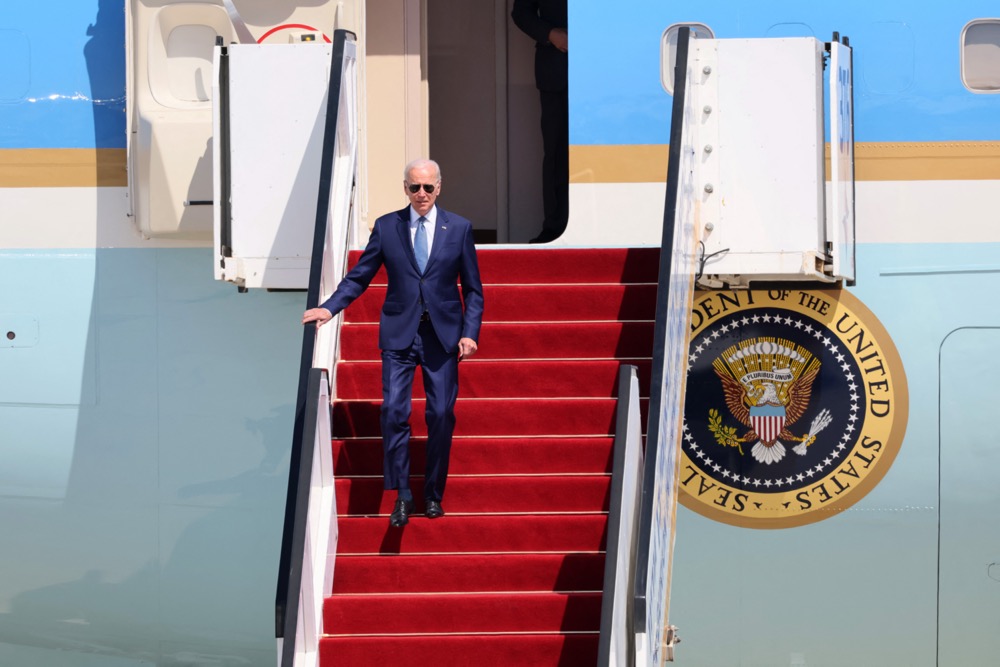
Joe Biden is no stranger to Israel. This is his 10th visit. (AFP)
This time it was the turn of President Isaac Herzog and Yair Lapid, Israel’s interim prime minister as it awaits yet another parliamentary election at the end of the year, to welcome Biden. The men exchanged fist bumps, in line with White House guidance that the US president would be avoiding personal contact because of COVID-19 precautions.
However, Biden made an exception for Benjamin Netanyahu, sharing a hearty handshake with the opposition leader and former prime minister. The president also placed a friendly hand on the shoulders of several Israeli dignitaries.
In a welcoming speech, Lapid told Biden: “Your relationship with Israel has always been personal,” and said the president was “one of the best friends Israel has ever known.”
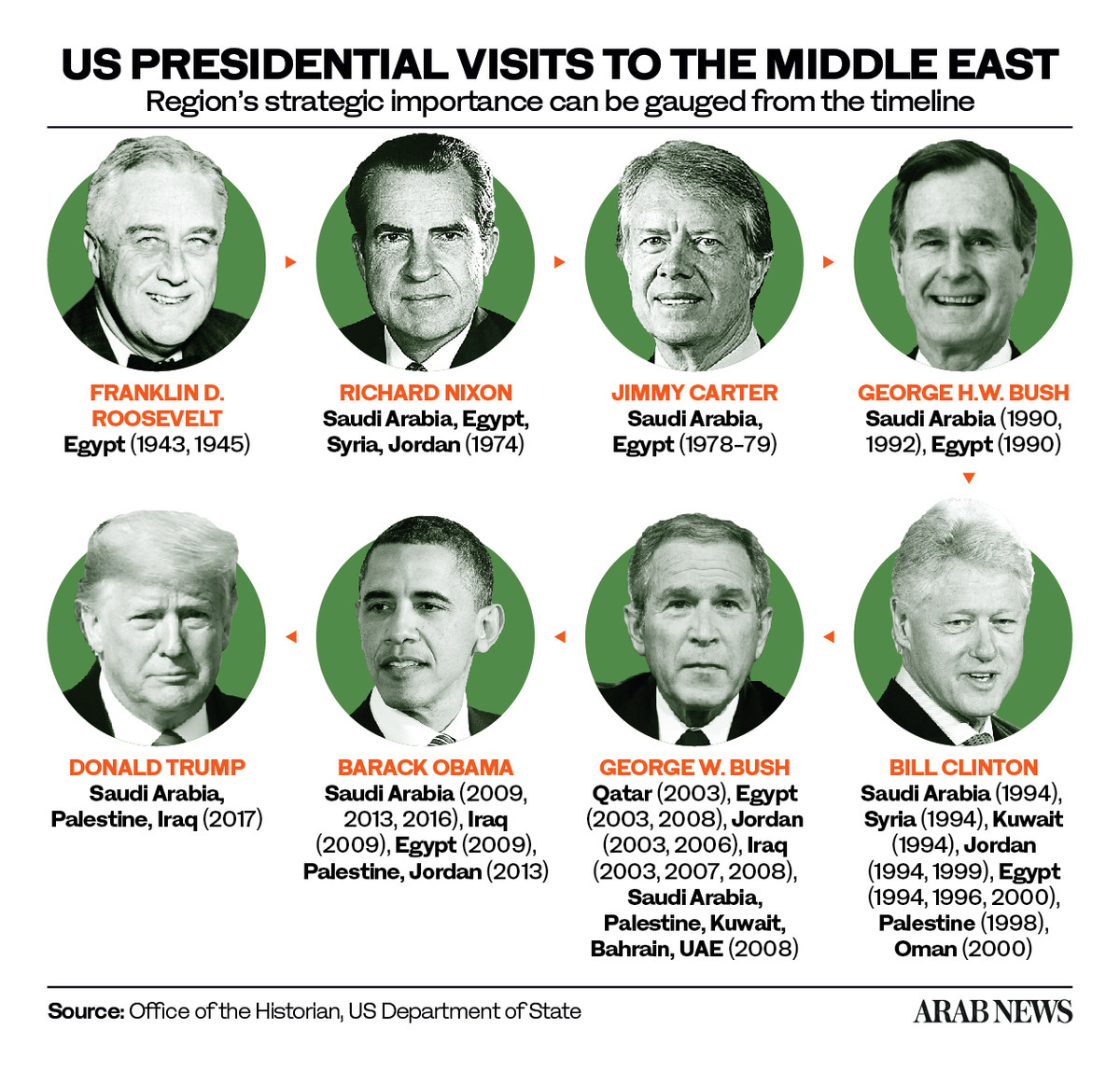
In a similar vein, Herzog played on Biden’s first name, deeming him “both a visionary and a leader” like the biblical Joseph. Biden was “truly among family” in Israel, Herzog said.
In reply, Biden described the connection between the two countries as “bone-deep.” He said: “We have a full agenda over the next few days, because the relationship between Israel and the US covers every issue that matters to our mutual future. We are united in our shared values and our shared vision.
“I’m proud to say that our relationship with the state of Israel is deeper and stronger in my view than it’s ever been. With this visit, we’re strengthening our connections even further. We’ll continue to advance Israel’s integration into the region.”
The issue of Iran, particularly its nuclear program and regional meddling through proxy militias, tops the agenda for Biden’s visit — not just in Israel but also later when he visits Saudi Arabia.
Herzog referred on Wednesday to the “security challenges emanating directly from Iran and its proxies, threatening Israel and its neighbors and endangering our region.”
Lapid said that he and Biden would “discuss building a new security and economy architecture with the nations of the Middle East,” following US-brokered Abraham Accords in 2020 with the UAE, Bahrain and Morocco.
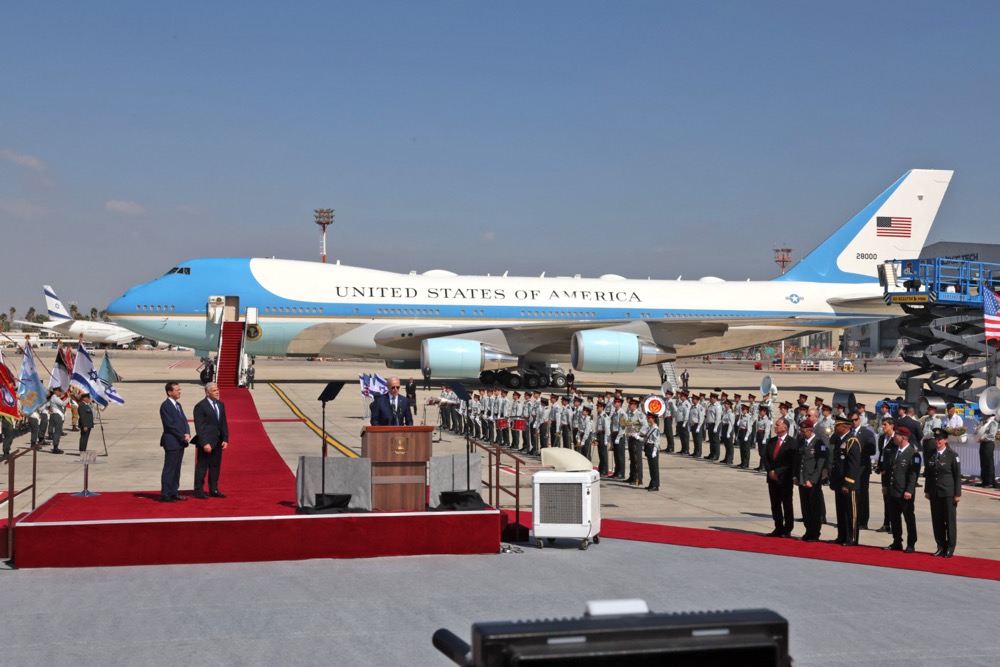
Biden was “truly among family” in Israel, President Isaac Herzog said. (AFP)
“And we will discuss the need to renew a strong global coalition that will stop the Iranian nuclear program,” he said.
Israeli officials said Biden’s visit would work toward what they called a Jerusalem Declaration on the US-Israel strategic partnership. One official said the joint declaration “takes a very clear and united stand against Iran, its nuclear program and its aggression across the region and commits both countries to using all elements of their national power against the Iranian nuclear threat.”
Indeed, before Biden had even left Ben Gurion Airport on Wednesday, Israeli security officials had shown him their latest hardware, which they say is essential in confronting Iran — the new Iron Beam system of anti-drone lasers.
Opinion
This section contains relevant reference points, placed in (Opinion field)
Israeli officials have increasingly been sounding the alarm over Iran’s fleet of unmanned aerial vehicles, which have already been used to attack Saudi Arabia and the UAE. This month the Israeli military intercepted four Iranian-made drones launched by Hezbollah and headed for an offshore gas rig.
On Wednesday, the Israeli army showed Biden footage of drones being intercepted by the Iron Dome defense system already in place, and the Iron Beam system which uses laser technology.
“It will be operational in very few years, it will be on the ground, integrated with Iron Dome,” said Daniel Gold, head of research at Israel’s Defense Ministry.
He said the two systems would complement each other. “They will work together, and the brain of Iron Dome — the command and control — will decide in real time who is going to shoot, the laser or the missile,” he said.
Presenting such technology to Biden is a strategic move for Israel, after Washington approved a billion-dollar package in September for the Iron Dome system.
After leaving the airport on Wednesday, Biden’s first stop was another rite of passage for every diplomatic visitor to Israel — a visit to the Yad Vashem Holocaust memorial to pay his respects to the 6 million Jews killed by Nazi Germany and its collaborators during the Second World War.
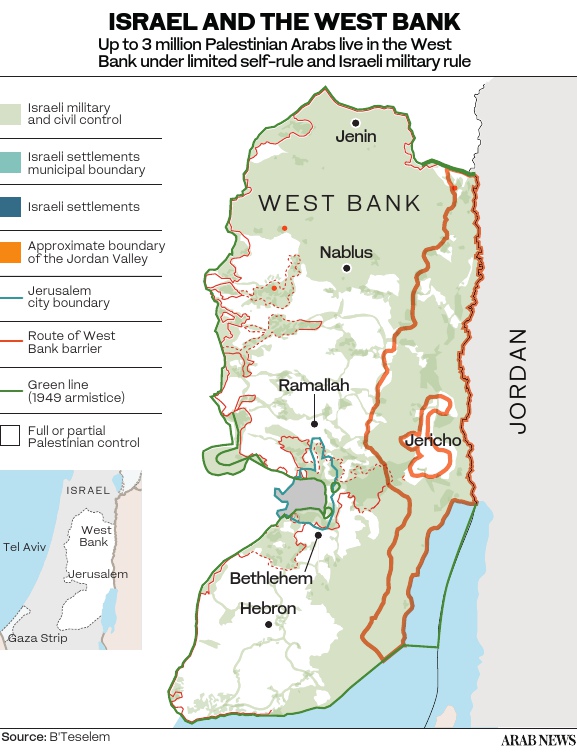
Joined by Lapid and Defense Minister Benny Gantz, both of whom are children of Holocaust survivors, Biden was invited to rekindle the eternal flame in the memorial's Hall of Remembrance.
A children’s choir sang a poem by Hannah Szenes, a female Jewish resistance fighter who was captured by the Nazis in Hungary and executed at the age of 23.
Two Marines placed a wreath on the stone crypt containing the ashes of Holocaust victims. Biden, wearing a skullcap, bent down to adjust it and placed his hand over his heart as the Marines saluted for a moment of silence.
Biden listened quietly as a cantor recited the remembrance prayer, before he greeted two Holocaust survivors — Rena Quint, 86, and Giselle Cycowicz, 95. Kissing the women on their cheeks, the president had tears in his eyes as he engaged them in conversation. “My mother would say: ‘God love you, dear’,” Biden told the women.
Quint later said she told Biden how her mother and brothers were killed in a death camp. Born in Poland, she was reunited with her father in a male slave labor factory, where she pretended to be a boy. Her father also was murdered. Quint arrived in the US in 1946 and was adopted by a childless Jewish couple.
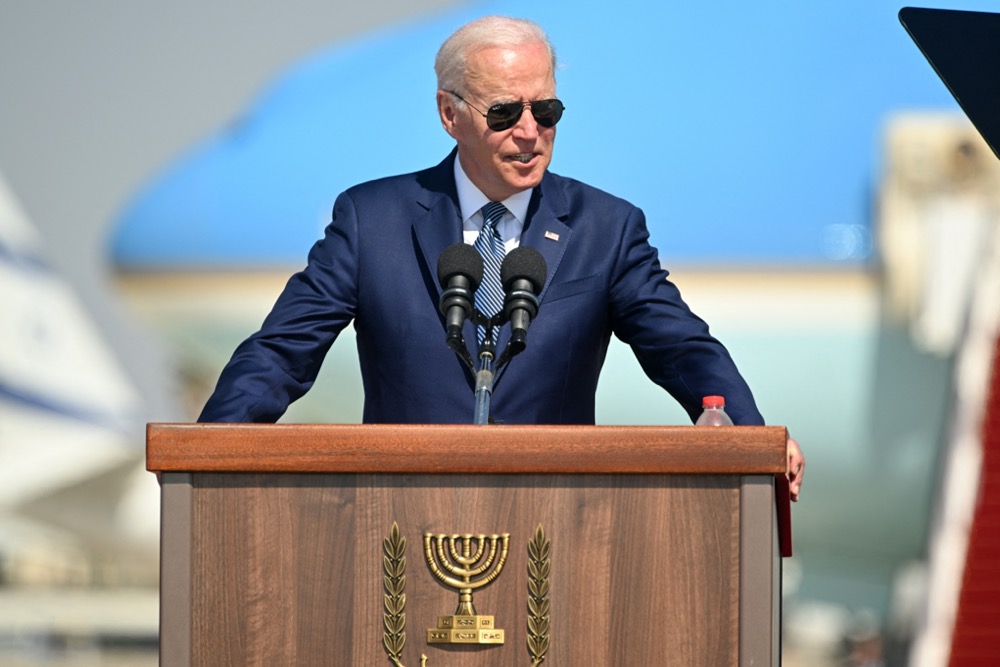
Biden said he would emphasize in talks with Israel and Palestinian leaders his continued support for a two-state solution. (AFP)
“Did you see the president hug me?” she said after her encounter with Biden. “He asked permission to kiss me and he kept on holding my hand and we were told not to touch him.”
The president is spending two days in Jerusalem for talks with Israeli officials before meeting Palestinian President Mahmoud Abbas on Friday in the West Bank.
Biden said he would emphasize in talks with Israel and Palestinian leaders his continued support for a two-state solution to the Israeli-Palestinian conflict, which he said was the best way to ensure a “future of equal measure of freedom, prosperity and democracy for Israelis and Palestinians alike.” But he acknowledged that it probably would not be feasible “in the near term.”
On Friday Biden will travel directly from Tel Aviv to Jeddah to meet King Salman, Crown Prince Mohammed bin Salman, other Gulf state leaders and officials from Egypt, Jordan and Iraq.



























